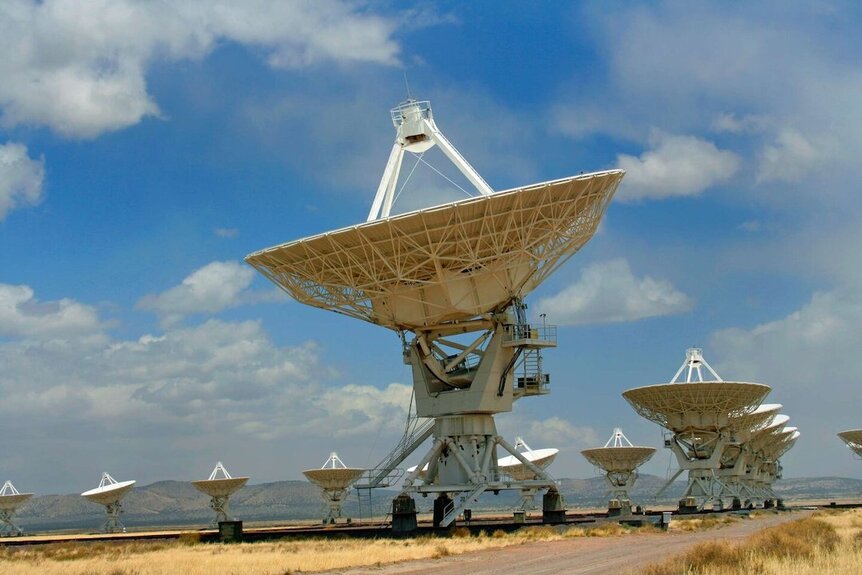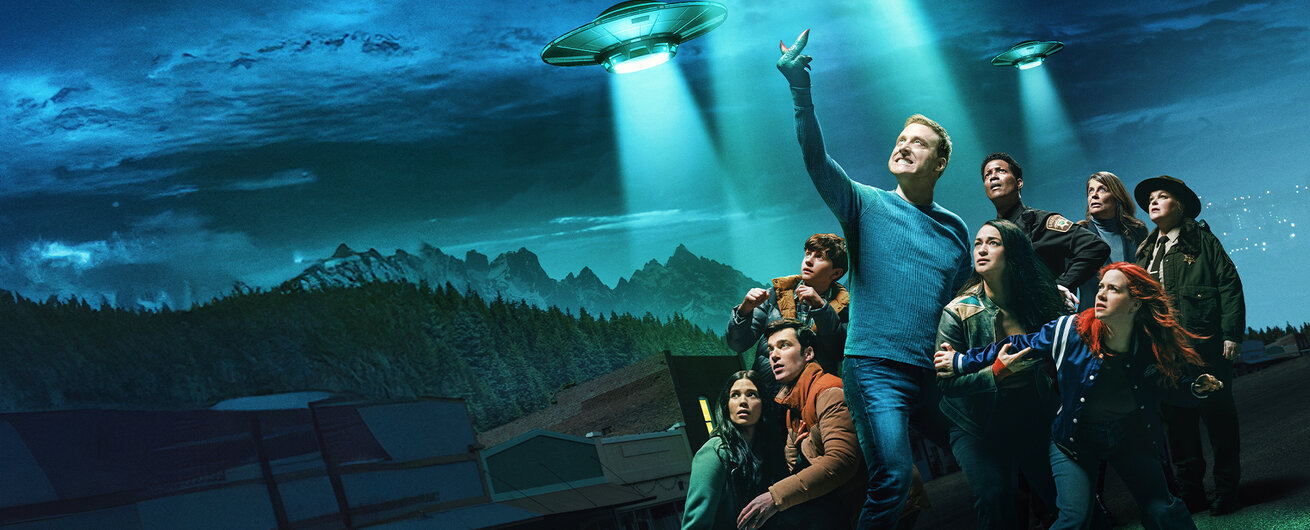Create a free profile to get unlimited access to exclusive videos, sweepstakes, and more!
New analysis suggests we're too young and uncool for aliens to care about us
Be our friends. We have pizza.

In SYFY’s own Resident Alien (now streaming on Peacock!), an alien intelligence, Alan Tudyk's Harry Vanderspeigle, comes to Earth on a mission to wipe out humanity. After engaging with us, he starts to realize he doesn’t want to harm us, at least most of the time. That conflict, between Harry’s burgeoning relationships with the people around him and his obligation to his own people, is part of what makes the story so fun. We often imagine alien civilizations arriving to our planet, holding an invitation to a grand new future or a swift and early grave. Both of those scenarios assume not only that other intelligences exist but that we’re also on their radar. The truth might be that we’re so uninteresting to alien life that they haven’t even bothered to try and exterminate us.
The more we peer into the cosmos it’s increasingly apparent that our galaxy is absolutely littered with planets. It seems that our system is not special in that regard, and worlds spring up just about everywhere there’s a star. Considering there are between 100 billion and 400 billion stars in the Milky Way alone, it seems nearly impossible that we would be the only life in the galaxy, let alone in the universe.
Assuming a random distribution, the odds are we fall somewhere in the middle of the pack in terms of technological ability which means there must be intelligences in the galaxy more advanced than ours. Imagine what we’ll be able to accomplish in another hundred years, or another thousand, then consider that our galaxy has existed for ten billion years. Our star didn’t even appear on the scene until about 4.5 billion years ago. If life is even a little bit common, there’s every reason to believe that civilizations could have sprung up before our planet even existed. No matter how you slice it, it feels like we should find a sky overflowing with intelligent activity, but we don’t. From a certain point of view, looking into the night sky and finding nothing but inanimate phenomena is almost stranger than if we had aliens at our doorstep.
RELATED: Searching for extraterrestrial intelligence: the science behind ‘Contact.’
That’s the problem Enrico Fermi was puzzling over during a lunch with friends in 1950. The question of why our celestial neighborhood appears to be empty has been associated with his name ever since. In the decades since the so-called Fermi Paradox was proposed around that lunch table, people have attempted in various ways to satisfactorily answer the question.
Some have proposed that life might actually be just as rare as it seems. They suggest that just because life arose here, doesn’t mean that it should or would arise anyplace else. It’s possible that we truly are alone or that life is so rare that everything else is lagging behind us. The reason we don’t see anyone else in the sky is because no one else has gotten there yet.
Others suggest that even if life is moderately common, there are certain filters which are difficult to overcome. One proposed filter is the transition from unicellular to multicellular life. On Earth, single celled life appeared almost immediately after the planet formed, nearly four billion years ago. But multicellular life didn’t appear until just 600 million years ago. Once multicellular life did arise, it proliferated like crazy, but getting through that gate took a long time.
If that is a filter then we managed to get through it, but some have proposed there’s another filter beating down our door. Humanity currently sits in a precarious position in which we possess the ability to destroy our civilization, either through the instant destruction of nuclear weapons or the slow-moving decay of runaway environmental collapse, but we haven’t yet figured out how to consistently get off world. In short, not only are all of our eggs in one basket, but we only have the one egg and we just figured out how to smash it. It won’t be such a big concern once we can duplicate eggs and spread them to other baskets. This analogy has run its course, but you get the idea. That could be another filter, one which some or even many civilizations don’t get through, and it’s one we’re currently facing down.
If the Great Filter hypothesis is correct, when we do finally expand across the galaxy, we might be met with world after world either filled with microbial life or the ruins of once-great civilizations. Amri Wandel from the Hebrew University of Jerusalem recently suggested an alternative explanation in a paper published on the ArXiv preprint server, which posits that it’s too early for us to be impatient, even if the galaxy is filled with aliens. On a cosmic scale, we’re still pretty new to the scene and it’s possible anyone who is out there just hasn’t noticed us yet.
RELATED: What if, like ‘Ad Astra’ suggests, there are no aliens?
We only sent our first artificial radio signals into the cosmos May 13, 1897. Even traveling at the speed of light that gives us a signal sphere with a diameter of 200 light years. Our galaxy is 100,000 light years from end to end and its one out of an estimated 200 billion galaxies in the observable universe. We are — even with all of our accomplishments — a very dim light in a very big, very dark, room. Anyone beyond that 200 light year bubble wouldn’t even know we exist, and it will be a while longer before they receive anything intelligible that we sent them on purpose.
Wandel suggests that the probability of being contacted by an alien intelligence is incredibly low until we reach the “Contact Era.” That’s the period after the development of radio technologies. Once the Contact Era begins, we exist inside a slowly widening bubble. At present, our radiosphere is about 200 light years across, but our contact bubble is only half that. We can only be contacted today but a civilization who had time to hear our signal and send something back. It’s also unlikely that anyone has cracked traveling at the speed of light, so our contact bubble is actually significantly smaller.
Wandel concludes that we shouldn’t expect to have been contacted yet unless civilizations are so abundant that we’re basically bumping up against one another. Even if our signals were picked up by an advanced alien intelligence, they’d still be beholden to the laws of physics. They couldn’t send any response, information, or spacecraft faster than the speed of light. The roundtrip cosmic lines of communication have terrible lag, and it’s a feature of existence, not a bug. If we want an invitation to the interstellar party, we’re going to have to be patient.
If you don't want to wait for aliens to finally answer our call, you can catch up on both seasons of Resident Alien on Peacock.































